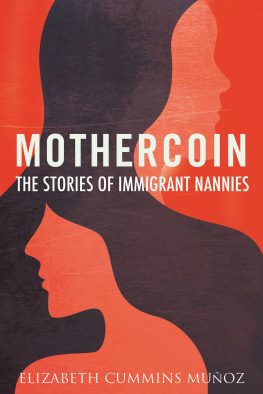BARBARA EHRENREICH AND ARLIE RUSSELL HOCHSCHILD
Whose baby are you? Josephine Perera, a nanny from Sri Lanka, asks Isadora, her pudgy two-year-old charge in Athens, Greece.
Thoughtful for a moment, the child glances toward the closed door of the next room, in which her mother is working, as if to say, Thats my mother in there.
No, youre my baby, Josephine teases, tickling Isadora lightly. Then, to settle the issue, Isadora answers, Together! She has two mommiesher mother and Josephine. And surely a child loved by many adults is richly blessed.
In some ways, Josephines storywhich unfolds in an extraordinary documentary film, When Mother Comes Home for Christmas, directed by Nilita Vachanidescribes an unparalleled success. Josephine has ventured around the world, achieving a degree of independence her mother could not have imagined, and amply supporting her three children with no help from her ex-husband, their father. Each month she mails a remittance check from Athens to Hatton, Sri Lanka, to pay the childrens living expenses and school fees. On her Christmas visit home, she bears gifts of pots, pans, and dishes. While she makes payments on a new bus that Suresh, her oldest son, now drives for a living, she is also saving for a modest dowry for her daughter, Norma. She dreams of buying a new house in which the whole family can live. In the meantime, her work as a nanny enables Isadoras parents to devote themselves to their careers and avocations.
But Josephines story is also one of wrenching global inequality. While Isadora enjoys the attention of three adults, Josephines three children in Sri Lanka have been far less lucky. According to Vachani, Josephines youngest child, Suminda, was twoIsadoras agewhen his mother first left home to work in Saudi Arabia. Her middle child, Norma, was nine; her oldest son, Suresh, thirteen. From Saudi Arabia, Josephine found her way first to Kuwait, then to Greece. Except for one two-month trip home, she has lived apart from her children for ten years. She writes them weekly letters, seeking news of relatives, asking about school, and complaining that Norma doesnt write back.
Although Josephine left the children under her sisters supervision, the two youngest have shown signs of real distress. Norma has attempted suicide three times. Suminda, who was twelve when the film was made, boards in a grim, Dickensian orphanage that forbids talk during meals and showers. He visits his aunt on holidays. Although the oldest, Suresh, seems to be on good terms with his mother, Norma is tearful and sullen, and Suminda does poorly in school, picks quarrels, and otherwise seems withdrawn from the world. Still, at the end of the film, we see Josephine once again leave her three children in Sri Lanka to return to Isadora in Athens. For Josephine can either live with her children in desperate poverty or make money by living apart from them. Unlike her affluent First World employers, she cannot both live with her family and support it.
Thanks to the process we loosely call globalization, women are on the move as never before in history. In images familiar to the West from television commercials for credit cards, cell phones, and airlines, female executives jet about the world, phoning home from luxury hotels and reuniting with eager children in airports. But we hear much less about a far more prodigious flow of female labor and energy: the increasing migration of millions of women from poor countries to rich ones, where they serve as nannies, maids, and sometimes sex workers. In the absence of help from male partners, many women have succeeded in tough male world careers only by turning over the care of their children, elderly parents, and homes to women from the Third World. This is the female underside of globalization, whereby millions of Josephines from poor countries in the south migrate to do the womens work of the northwork that affluent women are no longer able or willing to do. These migrant workers often leave their own children in the care of grandmothers, sisters, and sisters-in-law. Sometimes a young daughter is drawn out of school to care for her younger siblings.
This pattern of female migration reflects what could be called a worldwide gender revolution. In both rich and poor countries, fewer families can rely solely on a male breadwinner. In the United States, the earning power of most men has declined since 1970, and many women have gone out to make up the difference. By one recent estimate, women were the sole, primary, or coequal earners in more than half of American families. So the question arises: Who will take care of the children, the sick, the elderly? Who will make dinner and clean house?
While the European or American woman commutes to work an average twenty-eight minutes a day, many nannies from the Philippines, Sri Lanka, and India cross the globe to get to their jobs. Some female migrants from the Third World do find something like liberation, or at least the chance to become independent breadwinners and to improve their childrens material lives. Other, less fortunate migrant women end up in the control of criminal employerstheir passports stolen, their mobility blocked, forced to work without pay in brothels or to provide sex along with cleaning and child-care services in affluent homes. But even in more typical cases, where benign employers pay wages on time, Third World migrant women achieve their success only by assuming the cast-off domestic roles of middle- and high-income women in the First Worldroles that have been previously rejected, of course, by men. And their commute entails a cost we have yet to fully comprehend.
The migration of women from the Third World to do womens work in affluent countries has so far received little media attentionfor reasons that are easy enough to guess. First, many, though by no means all, of the new female migrant workers are women of color, and therefore subject to the racial discounting routinely experienced by, say, Algerians in France, Mexicans in the United States, and Asians in the United Kingdom. Add to racism the private indoor nature of so much of the new migrants work. Unlike factory workers, who congregate in large numbers, or taxi drivers, who are visible on the street, nannies and maids are often hidden away, one or two at a time, behind closed doors in private homes. Because of the illegal nature of their work, most sex workers are even further concealed from public view.
At least in the case of nannies and maids, another factor contributes to the invisibility of migrant women and their workone that, for their affluent employers, touches closer to home. The Western culture of individualism, which finds extreme expression in the United States, militates against acknowledging help or human interdependency of nearly any kind. Thus, in the time-pressed upper middle class, servants are no longer displayed as status symbols, decked out in white caps and aprons, but often remain in the background, or disappear when company comes. Furthermore, affluent careerwomen increasingly earn their status not through leisure, as they might have a century ago, but by apparently doing it allproducing a full-time career, thriving children, a contented spouse, and a well-managed home. In order to preserve this illusion, domestic workers and nannies make the house hotel-room perfect, feed and bathe the children, cook and clean upand then magically fade from sight.
The lifestyles of the First World are made possible by a global transfer of the services associated with a wifes traditional rolechild care, homemaking, and sexfrom poor countries to rich ones. To generalize and perhaps oversimplify: in an earlier phase of imperialism, northern countries extracted natural resources and agricultural productsrubber, metals, and sugar, for examplefrom lands they conquered and colonized. Today, while still relying on Third World countries for agricultural and industrial labor, the wealthy countries also seek to extract something harder to measure and quantify, something that can look very much like love. Nannies like Josephine bring the distant families that employ them real maternal affection, no doubt enhanced by the heartbreaking absence of their own children in the poor countries they leave behind. Similarly, women who migrate from country to country to work as maids bring not only their muscle power but an attentiveness to detail and to the human relationships in the household that might otherwise have been invested in their own families. Sex workers offer the simulation of sexual and romantic love, or at least transient sexual companionship. It is as if the wealthy parts of the world are running short on precious emotional and sexual resources and have had to turn to poorer regions for fresh supplies.














